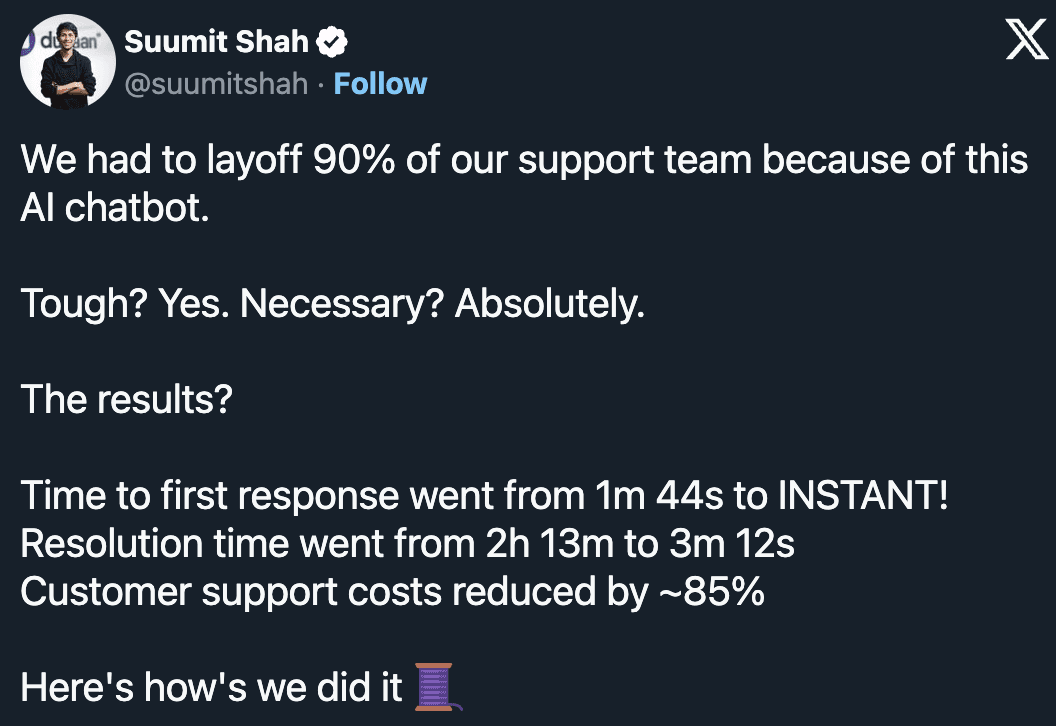Are AI agents the future of contact centers? Or is it all just hype?
Aug 14, 2024

There have been a fair share of hot potatoes being dropped around in 2024; CEO and Managing Director of IT giant Tata Consultancy Services (India’s second largest company) said recently in an interview with the Financial Times that “AI could kill off most call centers”.
(https://www.ft.com/content/149681f0-ea71-42b0-b85b-86073354fb73)
Another hot potato was dropped (shared) on X:

Phonely’s view
We believe that call centers (or contact centers, BPOs) aren’t going anywhere, however, adapting to new technology will lead to real advantages. Companies that successfully navigate the current technological landscape can achieve:
time and cost savings, resulting to lower operational expenses
resource allocation to revenue-generating activities like client acquisition and marketing to fuel further growth
reduced risk via lower overhead costs and enhanced compliance
The Evolution of Automated Calls
Where it started – IVR (Interactive Voice Responses)
Most companies today still use Interactive Voice Response (IVR) systems, where users are presented with a menu of options. While these systems are highly accurate, their scalability and flexibility are limited.
While convenient for businesses, the average abandonment rate of an IVR system is 15%, leading to frustration, loss of revenue and confusion. Additionally, the scope of what the IVR trees can do is relatively limited to a few different features.
Voice automation 2.0 – Phones Trees
These systems essentially gave a little more flexibility by allowing the user to speak in natural language, making it slightly more flexible than IVRs, however these systems still lacked the ability to respond with empathy, emotion, and could only handle one request at a time.
The future – AI voice agents
AI voice agents are not just a patch to delay customers from getting to a person. They can have real time conversations, and sound, talk and can interact with software just like a person.
AI voice agents are now possible due to the three following advancements:
1) improved transcription accuracy and speed, lead by providers: Deepgram, Whisper and Talkscriber
2) Large language model intelligence lead by: OpenAI, Anthropic, Llama
3) Voice synthesis technology, lead by: Elevenlabs, Play.ht, and Cartesia
To create an effective voice AI agent, the process is chaining these types of technology together, on custom hardware to optimize for speed and performance. When done correctly, LLM based voice systems are much more scalable and flexible, and can truly provide empathetic, humanlike support that can interact with software like a person.
Over the past 12 months there have been new startups popping up left and right claiming full AI phone answering, with few actually being able to deliver. For a full overview of the voice AI space, read our comparison here: www.phonely.ai
Benefits of voice AI

Lower operational expenses
Just like the internet changed the way that we do mail, the AI phone answering will change the way that contact centers operate their business. While there is much skepticism that call centers will cease to exist, and AI phone answering will take over, our thesis is that is not the case. We believe that contact centers, BPO’s and answering services will continue to serve their customers, however, their operational roles will now become easier with AI. AI has the capability to allow these businesses to:
work closely with clients
help them achieve better outcomes and results
achieve mutual growth through client success and retention
By integrating AI into their solutions, contact center decision makers can free up their time to focus on getting more clients and ensuring they receive the best possible experience.
Personalized, enhanced customer interactions
When properly configured, AI agents can navigate complex issues with ease, and create empathy and authenticity in the process. It can also track previous customer interactions, creating a truly personalized experience for clients, fueling meaningful experiences.
Integrations with other apps/websites and ease of use
This is probably the most important, yet (unfortunately) overlooked aspect contact centers should evaluate when choosing the right partner. Ease of setup and third-party integrations should be a major deciding factor.
Companies in each industry have a few key features they prioritize, which can elevate a product from “useful” to “exceptional”. For example, phone answering services often seek integrations with tools like calendar, Slack and email to streamline their workflow, whereas integration with something like Doordash is less of a priority (though no complaints about Doordash – I’m actually ordering takeout as I write this).
Our team at phonely.ai has a very sharp view on how integrations should function within the ecosystem, based on hundreds of conversations with decision-makers in the phone answering service industry. When they speak, we listen very carefully. (If you have a tool you’d like to see integrated into Phonely’s workflow, please don’t hesitate to reach out here!)
24/7 customer assistance
With the right knowledge base, workflow, and integrations set up, AI systems can work 24/7, while delivering high-value, personalized experiences to callers – making the contact center always available.
Robust analytics + accuracy & reliability
Humans are a bit different from AI’s the way an AI is trained is a bit of a black box. Obtaining reliable and repeatable information from AI can be challenging. It requires a strong emphasis on analytics and simulation testing. Both of these are native to Phonely’s platform.
Phonely’s team has created two solutions for this:
A robust analytic dashboard that lets you see previous calls, analyze sentiments, and more
Pre-deployment evaluations, where partners can test AI agents using previous call recordings to assess how the AI agent would have performed
The goal of the evaluation is to find the answer to one thing: did the AI agent accomplish its task?
We believe this is the future of voice AI. Building an AI agent is the first step – but does it work? This crucial step is missing in most platforms. Without proper evaluation, you risk deploying a system that might not work as intended.
By integrating this crucial step into Phonely, we make sure that your agent does what it’s supposed to do, reliable, accurately, again and again.











